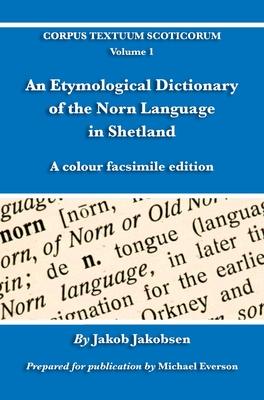Jakob Jakobsen's dictionary was first published in Danish in 1908 as Etymologisk Ordbog over det norr ne Sprog paa Shetland. Its English translation was published in two volumes, in 1928 and 1932 by David Nutt in London and Vilhelm Prior in Copenhagen, and in 1985 it was reprinted in Lerwick by the Shetland Folk Society. Both editions of the book are very scarce and those rare copies that are available from antiquarian booksellers tend to vary both in condition and in cost. This facsimile edition contains the entire text in a single volume.
A table of contents has been added to the front matter with section numbers given to help the reader navigate Jakobsen's introductory material; the section numbers have been added in the margin of the text itself. There were 40 corrections given on an errata sheet in volume I, and 21 corrections given in volume II; all of the corrections have been implemented on the scanned images and so the errata sheets have not been reproduced.
At first an attempt was made to scan the book in black and white, but the quality of the text in those images was questionable, particularly in the phonetic characters-obviously this was less than optimal. A colour facsimile preserves more information. Some intervention was required in the preparation of this edition, in particular straightening and centring the text to fit the text block, and making the correc-tions listed in the errata sheets, as discussed above.
With regard to the phonetic characters used in the dictionary, a few remarks should be made. The shapes of the glyphs used for a number of characters in the original font differ somewhat from those typically used today, and so a listing is given in 7.1 and 7.2 below showing first Jakobsen's glyphs, and then the modern forms which can be used in citation from this book. The values of the characters as Jakobsen describes them also differ in a number of cases from values of characters used in modern transcription into the International Phonetic Alphabet. In the third column the probable correspondences to the descriptions found on pp. VII-IX above are given. It is not difficult to take Jakobsen at his word, and it appears that by and large Jakobsen is using a modification of the Danish dialect alphabet known as "Dania" in this work. The IPA transcriptions given below follow those given in the article "en.wikipedia.org/wiki/Dania_transcription" (revision 2021-06-20T01:45:34), which seems to do a reasonable job of relating the two systems.
